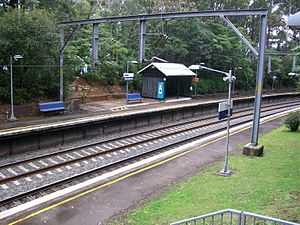Wombarra railway station
| Wombarra | |||||||||||
|---|---|---|---|---|---|---|---|---|---|---|---|
 | |||||||||||
| Station statistics | |||||||||||
| Address |
Morrison Avenue, Wombarra New South Wales, Australia | ||||||||||
| Coordinates | 34°16′32″S 150°57′12″E / 34.275686°S 150.953361°ECoordinates: 34°16′32″S 150°57′12″E / 34.275686°S 150.953361°E | ||||||||||
| Line(s) | South Coast line | ||||||||||
| Distance | 64.36 km (39.99 mi) from Central | ||||||||||
| Structure type | Ground | ||||||||||
| Platforms | 2 (2 side) | ||||||||||
| Tracks | 2 | ||||||||||
| Other information | |||||||||||
| Opened | 1917 | ||||||||||
| Station code | WMJ | ||||||||||
| Owned by | RailCorp | ||||||||||
| Operator | NSW TrainLink | ||||||||||
| Website | Wombarra | ||||||||||
| Services | |||||||||||
| |||||||||||
Wombarra is a railway station on the South Coast Line of the NSW TrainLink Intercity network, serving the village of Wombarra, a small community located below the northern Illawarra escarpment.
It lies on a long curve at a distance of 64 kilometres by rail from Sydney's Central Station and 24 kilometres by rail from Wollongong station, at about 60 metres above sea level.
The station opened originally in 1916 at its location known as "Brown's Ridge", named after the Brown family who owned the nearby Victorian era mansion "Aliumare". The nearest station for the locality previously had been the first South Clifton station, built in 1888 opposite where the landmark Scarborough Hotel stands today. This was closed in 1903 when today's Scarborough station was built in its present location further north, disadvantaging the residents of the (smaller) Wombarra community.
The new station was located on the immediate southern side of the brick road bridge which carries Morrison Avenue (previously Progress Road) over the South Coast railway line. It provided rail access for workers at the nearby South Clifton colliery and the local community, as well as a new ability to access growing work opportunities in Wollongong and Port Kembla steelworks and collieries. In the 1920s and 1930s rail excursions to the South Coast were advertised including accommodation at the Brown's residence operating (then) as a guest house.
The station today still consists of two side platforms, but the original weatherboard buildings no longer exist. On the Down platform to Wollongong, there was a single semi-open shelter shed open to the platform with wooden slat bench seating and concrete floor, with ladies' toilet and store room adjacent. At the very south end of that platform was the gentleman's' toilet actually placed off-platform. On the Up platform to Sydney, there was a single small weatherboard shed with wooden floor and bench seating open to the platform. Both platforms had steel and concrete platform extensions added at some later date. Pre-electrification of the line, steps led down to a wooden crossing place underneath the bridge between each platform, that was used by station staff (and locals) to cross the tracks.
Wombarra station was serviced by mainline Sydney-Wollongong-Port Kembla/Kiama trains, as well as the formerly extensive Wollongong suburban trains, which for many years operated between Scarborough, the next station to the north, and Wollongong-Port Kembla.
While all services relied on steam and later diesel hauled compartment rolling stock (the "Dog Boxes"), these were complemented by extensive use of "Tin Hare" rail motors (hard seats) and "Cat-Face" 1930s DMUs (leather sprung seating in two classes).
Since electrification in the late 1980s, original buildings have been removed and facilities modernised. With the decline in Illawarra collieries since the 1960s, replacement of Scarborough rolling stock stabling yards and Scarborough's status as the north suburban terminus, fewer services stop at Wombarra today.
It is served by one train every 2 hours during the off-peak, with more trains during peak hours.
Platforms and services
| Platform | Line | Stopping pattern | Notes |
| 1 | South Coast Line | intercity services to Helensburgh, Waterfall and Sydney Terminal | peak hour intercity services to Bondi Junction |
|---|---|---|---|
| 2 | South Coast Line | intercity services to Thirroul, Wollongong, Port Kembla, Dapto and Kiama via Wollongong |
Image gallery
-

Ticket machine and entrance to platform 1
-

Platform 1
-

Platform 2 looking north
-

Platform 2 looking south
-

Looking north
-

Sign outside station
-

Bridge at north side of platforms
-

Pedestrian section of bridge
-

Platforms 1 and 2 seen through the metal safety fence on the bridge